iHuman研究所创始所长Raymond Stevens经过长期的体能训练及筹备,于今年四月从尼泊尔南坡攀登珠峰,成为iHuman挑战珠峰第一人。本文将其攀登经历,以及给年轻学生、学者的寄语分享如下。
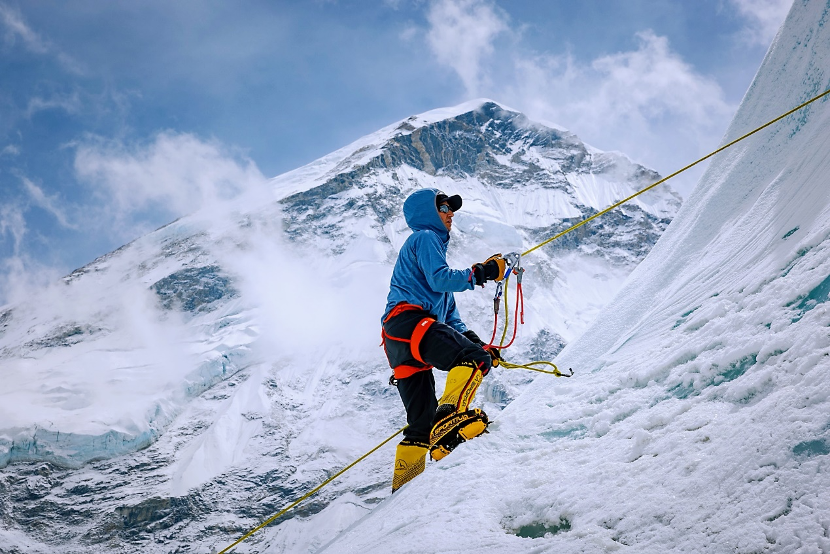
此处海拔5600米。在这个海拔高度,由于太阳直射,白天气温可达20摄氏度,阳光消失时温度迅速降低至零下20摄氏度。Raymond Stevens教授是国际知名结构生物学家,上海科技大学iHuman研究所的创始所长。在过去三十年中,Raymond Stevens聚焦于人体生物大分子,尤其是G蛋白偶联受体的结构与功能研究,发表高水平研究论文300余篇,在国际顶尖科学期刊,如Cell, Nature和Science上,累计发表研究论文50余篇,并参与多项上市药物的研发工作。
工作日程极满的Raymond Stevens,有着非常鲜明的人格魅力。他对待工作和生活充满激情,坚韧不拔,敢为人先。总能用切身行动来激励和带动年轻的学生和同事。作为iHuman研究所创始的元老,Raymond Stevens与刘志杰所长携手为iHuman营造了非常团结、充满活力的气氛,为一系列优秀科研成果的产出提供了肥沃的土壤。
攀登珠峰是Raymond Stevens多年的梦想。这样一项极为艰险的活动,需要应对低温缺氧,巨大的体能消耗,以及复杂多变的气候环境。种种挑战,对攀登者的身心素质要求极高。Raymond Stevens坚持每日6点晨起跑步,数十年如一日。也为达成目标进行了大量高强度的攀岩训练。然而原本定于2020年春季的攀登计划,因新冠疫情而被迫取消。Raymond Stevens并没有轻易放弃目标,持续积极准备。2020年10月Raymond Stevens返回上科大,根据疫情防控要求隔离14天。为了维持体能,隔离期间,酒店房间成为他锻炼的场所。床铺和沙发被巧妙地用为扶手,悬空锻炼臂力;桌子、椅子成为路障,帮助绕圈慢跑。在狭小封闭空间中,Raymond Stevens每日保持5公里跑量,令人佩服。
克服种种阻碍,Raymond Stevens在2021年4月从尼泊尔境内开启了攀登珠峰的旅程。登山过程中,Raymond Stevens保持与上科大师生的密切联系,分享旅途见闻。身处喜马拉雅山脉的他,不忘鼓励课题组师生说出自己的“珠峰梦想”,激励大家对人生不设限,勇于追求自己理想的未来。
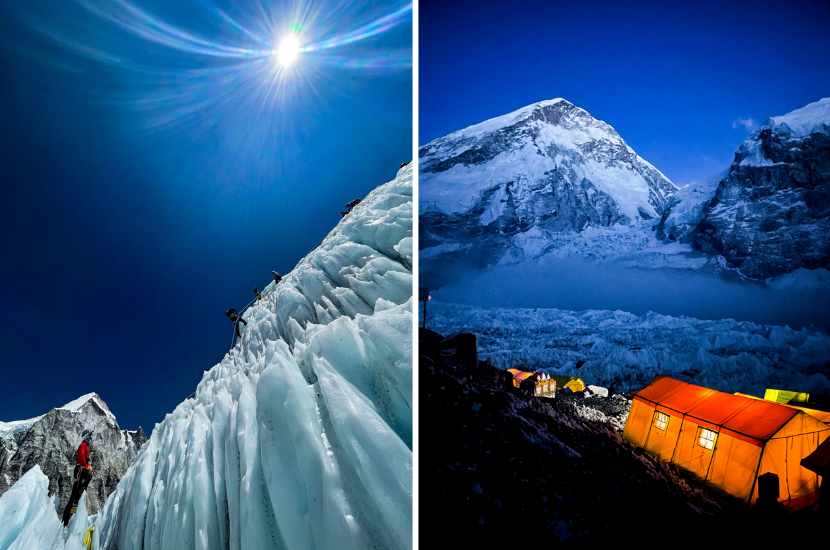
喜马拉雅山脉的日与夜。
(左图)因巨大昼夜温差而形成的陡峭冰柱。(右图)珠峰大本营的餐厅帐篷。
生活并不总能如愿。此次登山过程中天气恶劣多变,攀登队伍遇到了剧烈的暴风雪,在海拔6400余米的C2营地被困数日。随后尼泊尔珠峰大本营疫情突然爆发,Raymond Stevens与同行者在C3营地(海拔7300米)不得不做出折返的艰难决定。
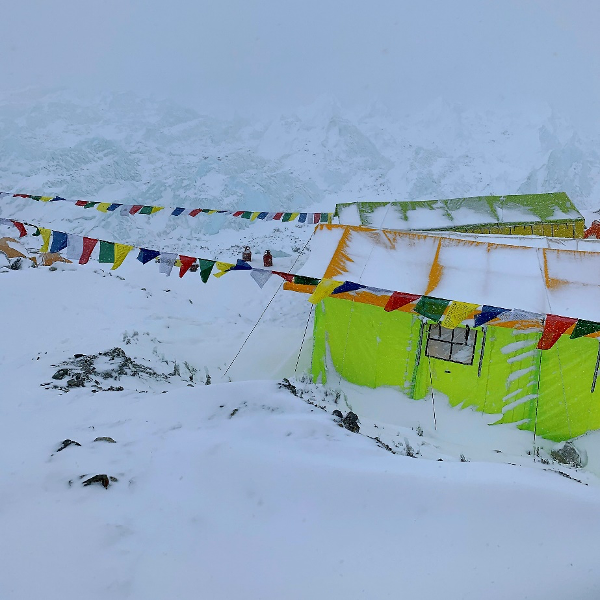
暴风雪突袭营地。持续数日的大雪、凛冽寒风和极低的气温将一行人困于帐篷内。
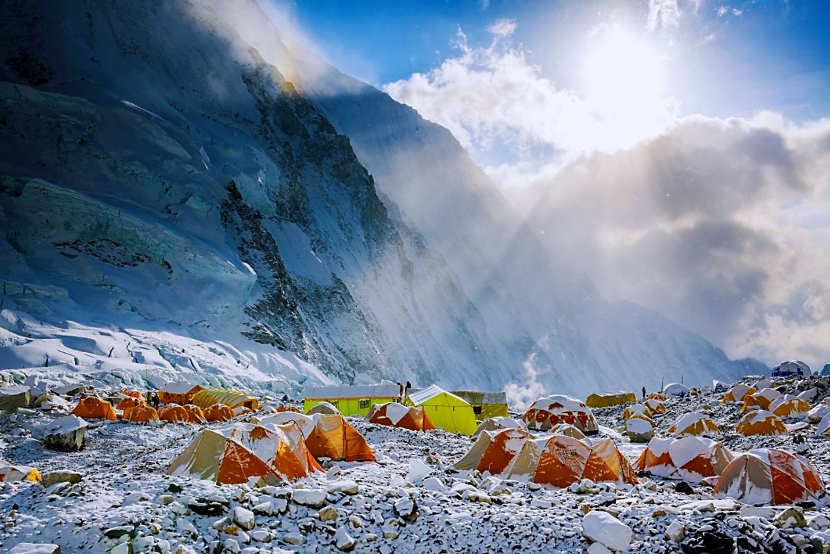
2021年4月,风暴过后的珠峰C2营地(海拔6400米)。
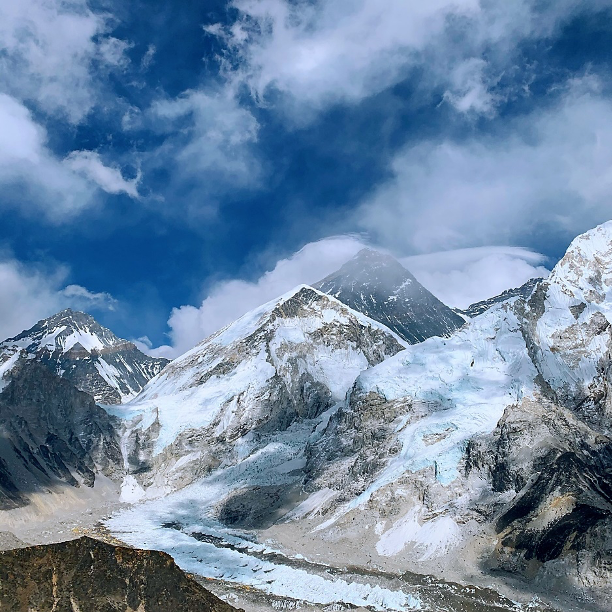
永远的珠穆朗玛峰。照片中清晰可见的最高峰就是珠穆朗玛峰。图中倾泻而下的是发生过无数死亡事故的“动荡的冰川”昆布冰瀑。
尽管此次珠峰之行未能如愿登顶,但与预期不符的意料之外何尝不是生活中的常态?Raymond Stevens仍未放弃源于少年时的珠峰梦想。珠峰常在,持续努力,终能达成所愿。他也期望将自己的经历与大家分享,愿诸君认清自己的珠峰,在科研征途上莫轻言放弃,勇攀高峰。
后 记
关于攀登珠峰的艰辛过程,以及最终因珠峰大本营突发疫情不得不放弃登顶的艰难抉择,我们与Raymond Stevens进行了深入的沟通。现将对话原文,以及Raymond Stevens对年轻学生、学者的寄语整理如下:
Q1: Why did you decide to climb Mount Qomolangma, even when you have an exceptionally busy schedule? - I believe life is an adventure to be lived. Since I was in college, I wanted to run across the world biggest desert, climb the highest mountain in the world, and sail around the world. This is in addition to my scientific dream of helping people around the world by discovering medicines to treat different diseases. It’s important to have dreams and maintain a feeling like anything is possible. In regards to busy schedule, one has to prioritize what is important in life. Instead of thinking “there are only 24 hours in each day”, I look at it as “I get to use the 24 hours each day to do what I want, and I want to do something significant”. I always like the Steve Jobs quote about looking in the mirror each day “Am I doing the most important thing I can today”.Q2: What is the most memorable part / the hardest part during your climbing? - Most memorable was waking up each morning in the Himalaya mountains. These mountains are the most beautiful in the entire world, and I got to wake up each day to see them, and go to bed each night looking at them. Each day I would say “good morning” and “good night”to them. Hardest part was the decreased amount of oxygen in my body and adapting. But being patient and with time, my body adapted as science and experience predicted. It is amazing what the body can do.Q3: There are countless obstacles to reaching the summit of Mount Qomolangma, especially the unpredictable COVID-19 pandemic these two years. How do you view all these obstacles? How do you feel about not reaching the summit and why? - One has to be patient when pursuing their dreams and taking them one step at a time (yi bu bu lai, my favorite saying) or as Deng Xiaoping said, “crossing the river by feeling the stones”. I made a wise decision to not enter the “death zone” with Covid around, and so I will try again next year when Covid is not so bad and it is safer. I am very excited I get to go back next year, enjoy the Himalaya mountains including Mt Qomolangma and try again. One should not give up their dreams if they are important to them.Q4: What do you want to share with all young students and young colleagues? - Each and every person has one life to live. It is just as much work to do small things as it is to do big things, really! So you should think big and follow your dreams. I promise you will not regret it. I know people who regret not trying to accomplish their dreams when they become older, but I do not know anyone who regrets going for big dreams.






